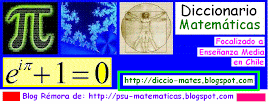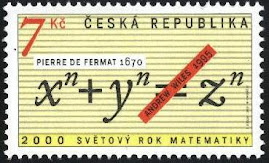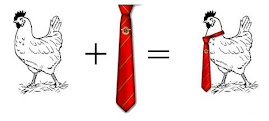Nuevas propuestas para mejorar la enseñanza de las matemáticas en los EE.UU.
17032008
En estos días se ha hecho público en los Estados Unidos el Informe sobre la enseñanza de las matemáticas Foundations for Success: The Final Report preparado para elU.S. Department of Education por el National Mathematics Advisory Panel presidido por Larry R. Faulkner y dirigido ejecutivamente por Tyrrell Flawn (marzo 2008).
Ver texto completo del Informe Final aquí ![]() 871 KB
871 KB
Palabras de la Secretaria de Educación de los EE.UU. al recibir el Informe del Panel.
Más abajo, ver comentario del Higher Education Chronicle: U.S. Panel on Math Education Laments Gaps in Research on What Works Best
Resumen ejecutivo
(Extractos)
Diagnóstico
International and domestic comparisons show that American students have not been succeeding in the mathematical part of their education at anything like a level expected of an international leader. Particularly disturbing is the consistency of findings that American students achieve in mathematics at a mediocre level by comparison to peers worldwide. On our own “National Report Card”—the National Assessment of Educational Progress (NAEP)—there are positive trends of scores at Grades 4 and 8, which have just reached historic highs. This is a sign of significant progress.
Yet other results from NAEP are less positive: 32% of our students are at or above the “proficient” level in Grade 8, but only 23% are proficient at Grade 12. Consistent with these findings is the vast and growing demand for remedial mathematics education among arriving students in four-year colleges and community colleges across the nation.
Moreover, there are large, persistent disparities in mathematics achievement related to race and income disparities that are not only devastating for individuals and families but also project poorly for the nation’s future, given the youthfulness and high growth rates of the largest minority populations.
This Panel, diverse in experience, expertise, and philosophy, agrees broadly that the delivery system in mathematics education—the system that translates mathematical knowledge into value and ability for the next generation—is broken and must be fixed. This is not a conclusion about any single element of the system. It is about how the many parts do not now work together to achieve a result worthy of this country’s values and ambitions.
Principales mensajes
The essence of the Panel’s message is to put first things first. There are six elements, expressed compactly here, but in greater detail later.
• The mathematics curriculum in Grades PreK–8 should be streamlined and should emphasize a well-defined set of the most critical topics in the early grades.
• Use should be made of what is clearly known from rigorous research about how children learn, especially by recognizing a) the advantages for children in having a strong start; b) the mutually reinforcing benefits of conceptual understanding, procedural fluency, and automatic (i.e., quick and effortless) recall of facts; and c) that effort, not just inherent talent, counts in mathematical achievement.
• Our citizens and their educational leadership should recognize mathematically knowledgeable classroom teachers as having a central role in mathematics education and should encourage rigorously evaluated initiatives for attracting and appropriately preparing prospective teachers, and for evaluating and retaining effective teachers.
• Instructional practice should be informed by high-quality research, when available, and by the best professional judgment and experience of accomplished classroom teachers. High-quality research does not support the contention that instruction should be either entirely “student centered” or “teacher directed.” Research indicates that some forms of particular instructional practices can have a positive impact under specified
conditions.
• NAEP and state assessments should be improved in quality and should carry increased emphasis on the most critical knowledge and skills leading to Algebra.
• The nation must continue to build capacity for more rigorous research in education so that it can inform policy and practice more effectively.
![]()
U.S. Panel on Math Education Laments Gaps in Research on What Works Best
By JJ HERMES
Washington
The Chronicle of Higher Education
March 14, 2008
An advisory panel President Bush charged with strengthening mathematics education publicly released its final report on Thursday. While the report’s authors spent little time focusing on higher education’s role in educating young students, they did have a subtle message for academe: There’s not enough tangible research on the subject to benefit policy decisions.
“The dearth of relevant rigorous research in the field is a concern,” the report, “Foundations for Success: The Final Report of the National Mathematics Advisory Panel,” states. It adds that significant debates on the merits of math-education practices “have devolved into matters of personal opinion rather than scientific evidence.”
The panel, which was established by a presidential executive order in April 2006, essentially narrowed its focus to how to better prepare students for eighth-grade algebra. The group held 11 meetings over the past two years.
Among the final report’s recommendations are those that urge a more streamlined early-education math curriculum and a refocusing of standardized tests to better emphasize algebra skills.
Research Falls Short
But many recommendations were blunted by a lack of “consistent or convincing” research.
For example, the report states that a review of 11 studies that “met the panel’s rigorous criteria” found that encouraging students to use calculators has “limited or no effect” on problem solving and conceptual development. Only one of those 11 studies, the report noted, was conducted within the last two decades.
The report went on to suggest that the relationship between student achievement and whether a teacher was certified to teach mathematics remains ambiguous.
“Not much is known from generalizable research about what exactly makes up an effective teacher,” said Larry R. Faulkner, the chairman of the panel and a former president of the University of Texas at Austin, at a briefing for reporters on Wednesday. “Surprisingly little is known about these things, given the importance of that question and the number of years people have been dwelling on it.”
Douglas H. Clements, a professor of early childhood, mathematics, and computer education at the State University of New York at Buffalo, has been dwelling on such research for a number of years. He also served on the national panel.
“I do think we should be doing more testing-specific hypotheses,” Mr. Clements said. “There’s been too much in educational research in playing around with the fringes.”
However, he does not believe the report should be interpreted as a criticism of the considerable contribution researchers have already made.
Mark A. Constas, an associate professor of research methodology at Cornell University’s department of education, agreed that math-education research is a field that has been dominated by qualitative studies when more hard data are needed.
A law passed six years ago, the Education Sciences Reform Act of 2002, helped set a federal role in supporting more quantitative research, Mr. Constas said, although he believes it is too early to see the full effects of that legislation. Still, he said, the math panel’s final report may push the Education Department’s Institute of Education Sciences, which was created by that act and is up for Congressional reauthorization, to redouble its efforts to gather more such data.
“My hunch is that this is going to give the Department of Education, and IES, a more-developed foundation on which to establish their research priorities,” Mr. Constas said. “They’re moving in this direction already.”
Copyright © 2008 by The Chronicle of Higher Education





































No hay comentarios:
Publicar un comentario